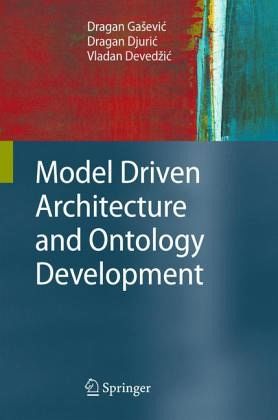
Model Driven Architecture and Ontology Development
Versandkostenfrei!
Nicht lieferbar
Defining a formal domain ontology is generally considered a useful, not to say necessary step in almost every software project. This is because software deals with ideas rather than with self-evident physical artefacts. However, this development step is hardly ever done, as ontologies rely on well-defined and semantically powerful AI concepts such as description logics or rule-based systems, and most software engineers are largely unfamiliar with these.
Gaevic and his co-authors try to fill this gap by covering the subject of MDA application for ontology development on the Semantic Web. Part I of their book describes existing technologies, tools, and standards like XML, RDF, OWL, MDA, and UML. Part II presents the first detailed description of OMG's new ODM (Ontology Definition Metamodel) initiative, a specification which is expected to be in the form of an OMG language like UML. Finally, Part III is dedicated to applications and practical aspects of developing ontologies using MDA-based languages. The book is supported by a website showing many ontologies, UML and other MDA-based models, and the transformations between them.
"The book is equally suited to those who merely want to be informed of the relevant technological landscape, to practitioners dealing with concrete problems, and to researchers seeking pointers to potentially fruitful areas of research. The writing is technical yet clear and accessible, illustrated throughout with useful and easily digestible examples." from the Foreword by Bran Selic, IBM Rational Software, Canada.
"I do not know another book that offers such a high quality insight into UML and ontologies." Steffen Staab, U Koblenz, Germany
Gaevic and his co-authors try to fill this gap by covering the subject of MDA application for ontology development on the Semantic Web. Part I of their book describes existing technologies, tools, and standards like XML, RDF, OWL, MDA, and UML. Part II presents the first detailed description of OMG's new ODM (Ontology Definition Metamodel) initiative, a specification which is expected to be in the form of an OMG language like UML. Finally, Part III is dedicated to applications and practical aspects of developing ontologies using MDA-based languages. The book is supported by a website showing many ontologies, UML and other MDA-based models, and the transformations between them.
"The book is equally suited to those who merely want to be informed of the relevant technological landscape, to practitioners dealing with concrete problems, and to researchers seeking pointers to potentially fruitful areas of research. The writing is technical yet clear and accessible, illustrated throughout with useful and easily digestible examples." from the Foreword by Bran Selic, IBM Rational Software, Canada.
"I do not know another book that offers such a high quality insight into UML and ontologies." Steffen Staab, U Koblenz, Germany




